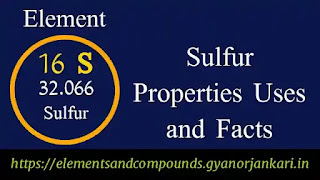Properties Uses and Facts about Sulfur
What is Sulfur
Sulfur is classified as a nonmetal, and chemically sulfur is an element.
Sulfur is found in three different forms (Allotropes). Sulfur has the symbol
S, atomic number 16, and atomic mass 32.066 amu. Sulfur atom has 16
electrons, 16 protons, 16 neutrons and 3 energy levels. Sulfur is located in
Group 16, Period 3 and Block P in the Periodic Table. The density of sulfur
is 2.07 grams per cubic centimeter. Sulfur is found in the solid state at
room temperature, its melting point is 115.21 °C (239.38 °F), and its
boiling point is 444.6 °C (832.28 °F).
Sulfur has been used for thousands of years, so it is unknown who
discovered it.

|
| Sulfur Properties Uses and Facts |
Properties of Sulfur
- Sulfur is a yellowish soft, odorless, crystalline solid.
- Sulfur is found in three forms (Allotropes), Orthorhombic, Monoclinic and Amorphous. Orthorhombic is the most stable form of sulphur. Monoclinic sulfur is found between 96°C to 119°C temperature and on cooling it again turns into orthorhombic sulphur. Molten orthorhombic sulfur is quickly cooled to form amorphous sulphur, which is soft and ductile.
- On burning sulphur, sulfur dioxide gas comes out with a blue colored flame, which is a toxic gas.
- On melting sulphur, it turns into a red colored liquid.
- Sulfur is a bad conductor of electricity.
- Sulfur is insoluble in water.
- Sulfur can react with all metals except gold and platinum to form metal sulfides.
- Sulfur can react with most elements.
Uses of Sulfur
- Sulfur is most commonly used in the production of sulfuric acid (H2SO4).
- Sulfuric acid derived from sulfur is used in the manufacture of fertilizers, refined oils and lead-acid batteries, and in many industrial processes.
- Sulfur is used in the vulcanization of rubber.
- Sulfur is used in the manufacture of black gun-powder, matches, firecrackers, fungicides and detergents.
- Sulfur is essential for all living beings, it is a component of proteins and enzymes in our body, and it is necessary for fat formation and strong bones in our body.
- Sulfur is used in making anti-rust cement.
- Hydrogen-sulfide is a flammable gas and has a very strong odor like rotten eggs, so it is mixed with natural gas in small quantities, so that it can be detected immediately in case of leakage of flammable natural gas.
- Calcium sulfate (gypsum) is used in cement and plaster.
Interesting Facts about Sulfur
- Sulfur is the tenth most abundant element in the universe.
- Sulfur is the 16th most abundant element in the Earth's crust.
- It is believed that it was due to Sulfur that it was possible for early life to arise on Earth.
- Sulfur is not toxic, but many gases formed from sulfur are extremely toxic, such as hydrogen-sulphide, sulfur-dioxide, carbondisulfide etc.
- Sulfurous acid is formed when sulfur-dioxide gas meets water. It is a weak acid, so sulfur-dioxide gas in the atmosphere causes acid rain.
- An adult person takes in about 1 gram of sulphur per day in the form of protein.
Detailed Information on Some other Elements
- Gold Properties Uses and other Details
- Silver Properties Uses and Other Details
- Mercury Properties Uses and other Details
- Hydrogen Properties Uses and Other Details
- Platinum Properties Uses and other details
- Titanium Properties Uses and other Details
- Aluminium Properties Uses and other Details
- Copper Properties Uses and Other Details
- Iron Metal Properties Uses and Other Details
- Nickel Metal Properties Uses and other Details
- Plutonium | Properties | Uses | Other Details
- Uranium | Properties | Uses | Other Details
- Lithium | Properties | Uses | Other Details
- Zinc Metal | Properties | Uses | Facts
- Cobalt Metal | Properties | Uses | Facts
- Chromium Metal | Properties | Uses | Facts
- Manganese Metal | Properties | Uses | Facts
- Vanadium | Properties | Uses | Facts
- Scandium | Properties | Uses | Facts
- Yttrium | Properties | Uses | and Facts
- Fluorine Gas | Properties | Uses | and Facts
- Chlorine Gas | Properties | Uses | and Facts
- Bromine | Properties | Uses | and Facts
- Iodine | Properties | Uses | and Facts
- Nitrogen | Properties | Uses | and Facts
- Carbon | Properties | Uses | and Facts
- Boron | Properties | Uses | and Facts
- Silicon | Properties | Uses | and Facts
- Phosphorus | Properties | Uses | and Facts






No comments:
Post a Comment